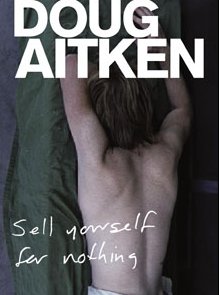Doug Aitken
dal 11/6/2005 al 23/7/2005
Segnalato da
11/6/2005
Doug Aitken
Galerie Eva Presenhuber (old location), Zurich
Sell yourself for nothing. The artist's installation explore human perception in a technocratic, accelerated environment, a world in which everybody is either constantly on the move or engaging in mediatised shifts of space. These works attempt to create new narrative structures that are outside the realm of linear narration.

Sell yourself for nothing
Galerie Eva Presenhuber is pleased to announce a show featuring the new
installations by Doug Aitken, the moment (2005) and shadows (2005).
Doug Aitken’s installation works explore human perception in a technocratic,
accelerated environment, a world in which everybody is either constantly on the move
or engaging in mediatised shifts of space. These works, described as “pure
communication†by the artist, attempt to create new narrative structures that are
outside the realm of linear narration. His video installations captivate viewers
with technically perfectly images and sounds that affect their movements and have
them thrown back on their own perception by refusing them protagonists to easily
identify with. For example, he takes almost static nature shots, where the “actionâ€
is focussed on tiny details or camera movements, and contrasts them with the
accelerated image effects typical of our media and information society. This
strategy opens up a space for viewers to become the protagonist of an inner journey
of perception that helps them to experience a moment of immediacy.
In Europe, Aitken’s work became known to a wider audience in 1999 with his electric
earth, which earned him the International Award at the Venice Biennale. A lone young
man watches TV and wanders about the urban waste land, recording the movements and
sounds of neon adverts, vehicles, security cameras and vending machines, until his
body explodes in an ecstatic dance – his only way of arriving at a momentary
experience of redemption in a world permanently flooded with stimuli in which he
seems to lose himself. In diamond sea (1997), Aitken transports us into the wilds of
the Namibian desert, where he goes looking for traces of human life in the
sealed-off area around two diamond mines. He finds the robotic movements of
prospecting machines, deserted monuments and ruined remnants of the machinery of
human civilisation. In these restless minds (1998), provincial salesmen are seen
speaking in public about their selling techniques. As they perform their monologues,
they talk fast
er and faster, to the point where their words become an incomprehensible, absurd
singsong.
The new installation, the moment (2005), features eleven monitors suspended from the
ceiling, showing a number of people in places of transition, such as hotel rooms or
airport terminals. Camera movements and each individual’s movements of the eleven
scenes are absolutely identical, forming a pattern that links the people together
while emphasising their individual traits. As time goes on, the scenes are
cyclically repeated but with subtle changes, uniting the people depicted in an
imaginary landscape of movement. The work simulates a new kind of acceleration, one
that enables us to move everyplace and no-place at once.
The second work, shadows (2005), explores the effect of a transition from a sunlit
to an artificially illuminated world. The camera follows purely people’s shadows:
they only exist through light. The result is a magical story of ghostly, weightless,
almost extraterrestrial creatures that seem oddly detached from their surroundings.
A figure moves from an unpopulated landscape to a crowded metropolis, providing the
viewer with insights into his restless, searching mind in scenes sketching out a
variety of emotionally charged encounters and experiences. The change in the light
affects the quality of his shadow. As time goes on, it is the light that becomes the
true protagonist, as it fades towards evening and makes the shadow disappear – and
the cycle of the work starts again.
Opening: Sunday, June 12, 11 am–7 pm
Galerie Eva Presenhuber
Limmatstrasse 270 - Zurich
Gallery hours: Tuesday–Friday: 12 noon–6 pm, Saturday: 11 am–5 pm



